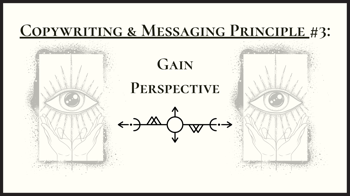I’m not going to get into how personal development has taken certain teachings about the ego and the shadow and skewed them, but pro tip: if they’ve never actually read Jung, they probably don’t know what they’re talking about.
Okay, I’m going to go on a quick tangent since everyone’s been talking about “shadow work” these days and none of them know what they’re talking about. Most people are not, and will not, ever going deep enough to meet their own shadow. People use egotistical thoughts and behaviors in lieu of their own understanding. Our shadow side is heretical. Consider a mother who got pregnant young and “wishes she’d never had this baby!” That’s certainly a nasty thought, but it’s still ego. True insight into what Jung labeled the shadow would be her considering smothering the child with a pillow until it died. And the “work” is accepting the part of her that could have even come up with a thought like that. Most people can’t fathom being able to conceive those types of ideas. So don’t listen to them when they try to give you advice.
I know, Superstar, you’re in touch with the principles of self, and you have no problem checking your ego. And I’m even going to ask you to do something else you’re probably great at: listening. You can’t be a personal development powerhouse without this ability. But in order to truly connect with people, you must remove your ego and listen to them fully. You must hear what they are saying to you, without your preconceived ideas getting in the way.
Most people mean well. The problem is meaning well becomes part of their identity, and specifically part of their ego. When people are speaking to them about their struggles, their pains, their unrealized dreams, those who know how to help them can’t hear what the person in pain is saying: all they can think about is themselves, and how they can fix all those problems, and they cannot wait to show them the antidote.
This is ego. And it must be checked.
You want to listen because what people believe is wrong with them—and the words they’re using to express such sentiments—will become how you shape your message. When you speak to them with their own words, they’ll be inspired to begin their journey.
Never assume what someone is experiencing. Always listen. Their words are your golden ticket.
I know that if people could just see the transformation you can help them with, then they wouldn’t waste another second before getting started. And I know you feel like the best-kept secret, and you need to explain why.
I know because you’ve told me these words, and I listened, without ego. And now here we are.
Kevin Rogers, an A-list copywriter I had the honor of being mentored by early on, interviewed the late Clayton Makepeace on his podcast.
He shared about the deep distrust his market had for doctors. Many viewed them as money-hungry shills for big pharma.
He never suggested they were wrong. He only listened, with total empathy, and ego removed.
And he came up with an excellent piece of copy:
“A surgeon will cut a hole right through your body to get to your wallet.”
“Some people say give the customers what they want, but that's not my approach. Our job is to figure out what they're going to want before they do. I think Henry Ford once said, 'If I'd asked customers what they wanted, they would've told me a faster horse.' People don't know what they want until you show it to them.”
People use this quote to prove their point that Steve Jobs wasn’t a good listener. And to some extent, he wasn’t. But the idea he didn’t listen to what customers or the market were saying isn’t entirely true.
The above statement was made in the early 80s. Jobs may not have taken the customer’s word for it, but he was attuned to the needs of the market. People were interested in computers, but they were too complex. His vision was to build beautifully designed computers that were simple to use.
This quote from him in 1997 shows how his view evolved:
“You’ve got to start with the customer experience and work backwards to the technology… I’ve made this mistake probably more than anybody else in this room… As we have tried to come up with a strategy and a vision for Apple, it started with ‘What incredible benefits can we give to the customer? Where can we take the customer?’... I think that’s the right path to take.”
The term “visionary” often gets misconstrued.
Tons of people can envision the future and communicate it to great effect. Steve Jobs was a visionary because he envisioned what technology should exist, then worked backwards to create it. The iPod, the computer mouse, the app store, the smartphone—he never asked people what they wanted because he understood that what people say they want and what they actually want are often at odds (we’ll cover this in just a moment).
He wasn’t able to check his ego early on, but later caught onto the idea that:
“...really great products come from melding two points of view—the technology point of view and the customer point of view. You need both.”
***
Copywriting & Messaging Principle #3: Gain Perspective
See the world for what it really is by allowing yourself time and space to gain perspective. Action is good, but not without forethought and discipline. Don't extinguish the fire inside, keep the embers burning until it's time to burst.

